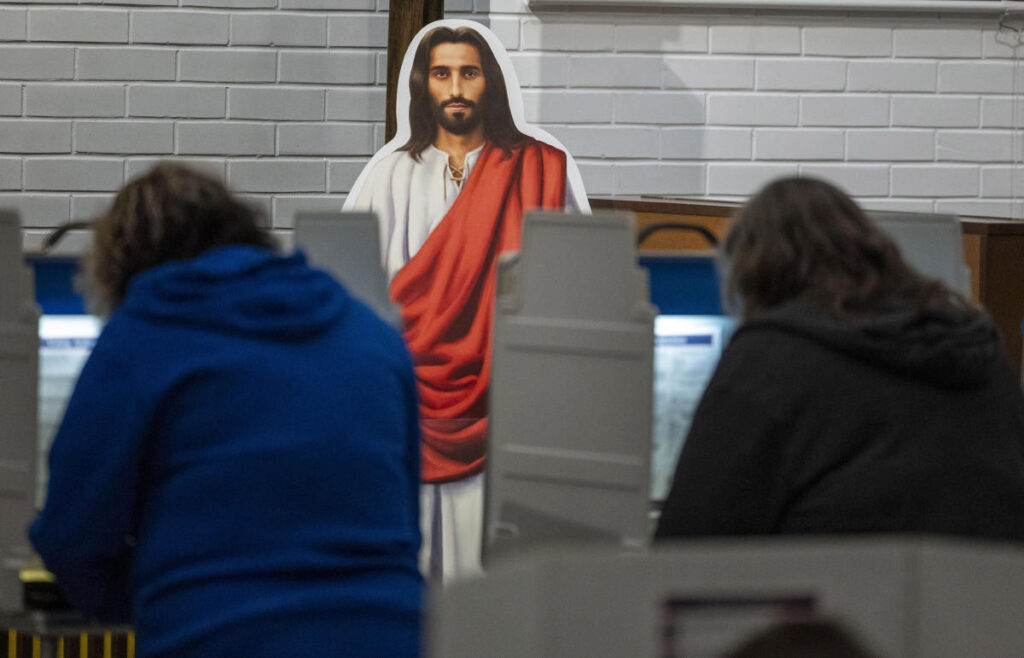In the recent electoral clash between Donald Trump and Kamala Harris, it appears Trump resonated similarly with various religious voter blocs compared to his earlier matchup with Joe Biden. Notably, Trump’s appeal among Catholic voters saw a marked improvement. According to the AP VoteCast, a large-scale survey of over 120,000 voters, Trump’s support among Catholics grew from a near-even split of 50% in 2020 to 54% in 2024, with notable shifts in states like North Carolina, Florida, and Texas. This demographic trend reveals a distinct racial divide; about 60% of white Catholics favored Trump, contrasting sharply with approximately 60% of Latino Catholics who supported Harris. Trump’s overall performance largely mirrored 2020 numbers with certain groups, particularly winning around 80% of support from white evangelical Christians.
Supporting data from VoteCast highlighted the partisan split among multiple religious affiliations. Harris received overwhelming support from Black Protestants, with approximately 80% voting for her. Jewish voters showed similar patterns, with around 69% backing Harris against about 30% for Trump, while two-thirds of Muslim voters also leaned towards Harris. Conversely, Mormons adhered more closely to Trump, with around 60% supporting him. The nonreligious demographic similarly leaned towards Harris, resulting in about 70% of their votes. These statistics underscore the continuing trends in American religious demographics, reflecting the profound polarization on social issues within the electorate.
The division among Catholic voters on critical social issues was particularly pronounced during the election cycle. Conservative Catholics expressed disillusionment towards Harris due to the Democratic Party’s strong advocacy for abortion rights. In contrast, more liberal Catholics found themselves at odds with Trump over his stances on immigration and social justice. Rev. Sam Sawyer, editor of the Jesuit magazine America, highlighted the need for justice advocacy, emphasizing the church’s role in defending immigrant rights amidst Trump’s harsh immigration policies, which he warned could fracture communities.
Supporters of Trump within religious circles included figures like Kristan Hawkins, a Catholic convert and president of Students for Life of America. While some of Trump’s stances on abortion left Hawkins disappointed, she remained actively supportive of his candidacy. She articulated the pragmatic approach many voters take, focusing on the need to limit societal evils rather than seeking perfection in candidates’ personal beliefs. Hawkins’ critique of Harris further underscores the friction many Catholics face in aligning with political ideals that conflict with their moral convictions, especially concerning abortion.
Archbishop Thomas Wenski of Miami noted a “cautious optimism” regarding Trump’s second term, suggesting that economic considerations might force Trump to reconsider his rigid stances on immigration. Wenski believed that embracing the contributions of migrants is essential for achieving economic goals, hinting at the necessity for pragmatic policy adjustments. Wenski also expressed discontent with certain Biden administration policies, which he perceived as encroaching on religious liberty. This sentiment reverberated through aspects of Trump’s previous term, particularly his judicial appointments, which were largely viewed favorably by conservative religious groups.
The electoral outcomes also mirrored traditional support patterns within the Jewish community, with Trump maintaining about 30% of their votes similar to previous years. Figures like Ted Deutch, CEO of the American Jewish Committee, expressed optimism about future collaboration with Trump’s administration, particularly in addressing issues surrounding Israel and antisemitism. However, contrasting views emerged from the Jewish Council for Public Affairs, which articulated concerns regarding Trump’s rhetoric and insistence on divisive narratives that threaten community safety and democracy. The mixed reactions highlight the complexity of the Trump-Harris election and the diverse perspectives within religious communities in America, underscoring the challenges ahead for unity amidst clear partisan divides.

